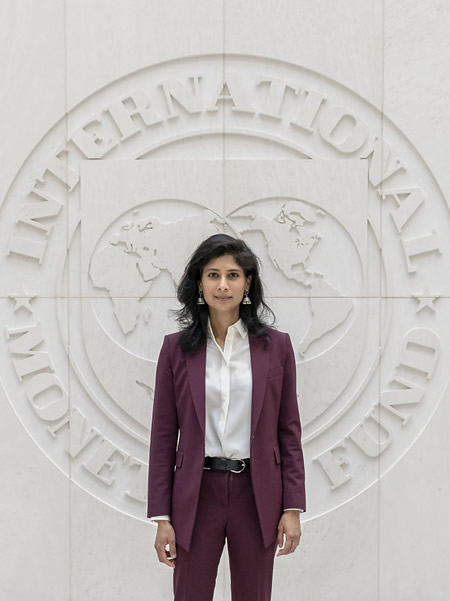« IBM unveils free digital learning platform 'SkillsBuild Reignite' to reach more job seekers & provide new resources to business owners in India. | Main | Chandigarh University Launches Financial Aid Program for the Meritorious and Deserving Students to Overcome Financial Crisis During COVID-19 »
June 26, 2020
International Monetary Fund significantly downgrades global growth in its latest update to the World Economic Outlook forecast.

Photo: IMF Chief Economist, Gita Gopinath, poses before providing the World Economic Outlook update during the COVID-19 Pandemic at the International Monetary Fund in Washington, D.C. on June 24, 2020. IMF Photo/Cory Hancock.
Washington, D.C. | June 25, 2020 — The International Monetary Fund is downgrading global growth significantly in its latest update to the World Economic Outlook forecast. The COVID-19 Pandemic sets the world economy back by $12 trillion in lost potential, the Fund’s chief economist Gita Gopinath said Wednesday in Washington, DC.
The effects of COVID-19 make IMF shift its forecast down to -4.9 percent this year overall, before a predicted return to growth in 2021. That’s a sharp -1.9 dip from its last forecast in April, said Gopinath.
“This is an unprecedented crisis, and this is indeed the worst recession since the Great Depression,” Gopinath added.
She warned that the forecast is the first time since the IMF began measuring that every region in the world is shrinking.
“It was already the worst recession since the Great Depression in April when we had projected growth for 2020 to be at minus three percent. But now at minus four-point nine percent, that is even more strongly true. And no country has been spared. Emerging markets, developing economies, advanced economies have all been very badly hit during this crisis,” said the Indian economist.
There is a higher-than-normal amount of uncertainty surrounding the forecast, the IMF says in the update.
“These projections imply a committed cumulative loss to the global economy over two years of over twelve trillion dollars from this crisis. The downgrade from April reflects worse than anticipated outcomes in the first half of this year, an expectation of more persistent social distancing into the second half of this year and damage to supply potential,” she explained.
Although there are some positive signs that the crisis may be ‘bottoming out,’ she said that countries need to remain vigilant.
“We’re not out of the woods. The health crisis is not over. And so we could see a potential second wave. We’ve assumed in our baseline number that there could be an increase in the number of infections. However, we are not going to see the kind of stringent lockdowns needed in the first half of this year,” said Gopinath.
The IMF has already provided emergency financial assistance to more than 70 countries since the Pandemic hit, totaling over $250 billion of its total firepower of $1 trillion in assets.
There is evidence that efforts have had a positive impact on blunting the impact on global growth, the quarterly report cited.
But countries will need to be prepared to adjust and take on reforms to deal with increased debt levels in the future, the IMF says.
“Indeed, when the recovery is stronger, we are in a better place with the health crisis better able to manage it than countries will have to undertake medium-term fiscal management. And when a while, through a combination of expenditure and revenue measures and now, countries should make sure that they are following best practices and putting proper safeguards in place using, you know, making sure there are proper fiscal accounting and fiscal transparency. But as of now, the need of the hour is for this kind of policy support,” Gopinath ended.
Source: International Monetary Fund
|GlobalGiants.Com|







Edited & Posted by the Editor | 2:03 PM | Link to this Post







